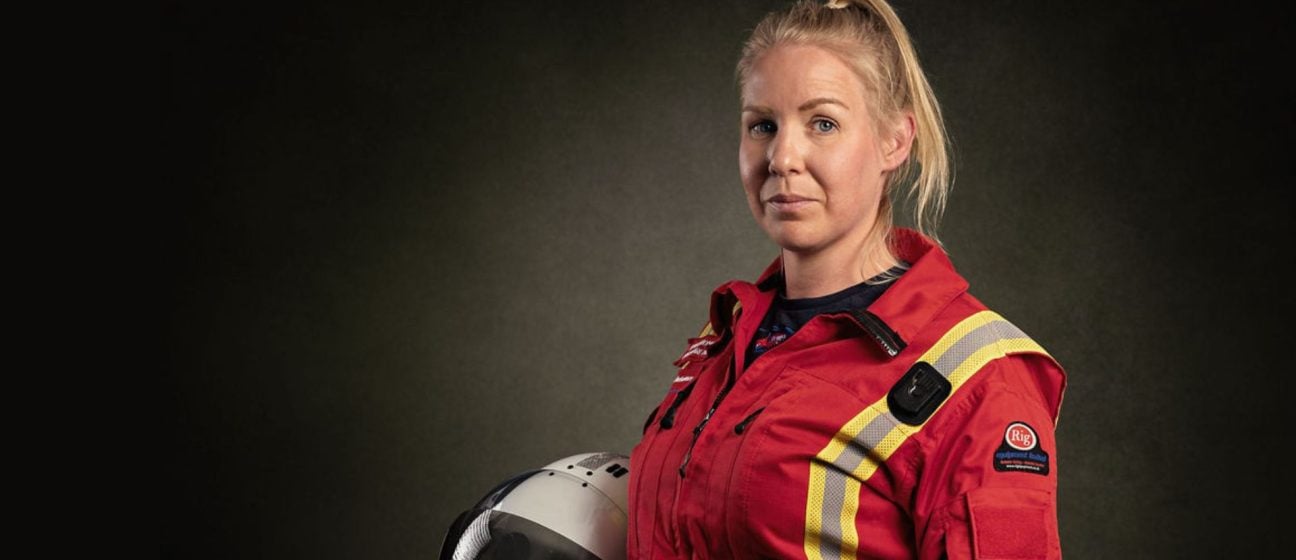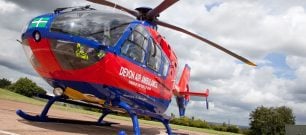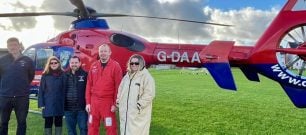
Jess, a Specialist Paramedic in Critical Care, shares insights into the emotional demands of her role.
Who is Jess?
When Jess was being photographed, the photographer asked her to reflect upon significant moments in her career as a Specialist Paramedic in Critical Care. Here Jess shares her sometimes very affecting experience of serving the people of Devon and local visitors and the importance of creating a healthy culture for the crew.
‘Our role requires us to quickly digest a great deal of information and communicate this information effectively between us. We must work fast, as time is critical, but with efficiency and accuracy so nothing is lost in our communication.
‘It helps to be emotionally astute so we can recognise the needs of everyone at the scene, which quite often not only includes the patient, but also their loved ones, the ambulance crew members and other emergency service personnel such as fire and rescue service or the police, as well as bystanders.
‘We must be OK with making difficult decisions with the confidence that we did what was right for that person or those people at the time.
‘I’ve always found serious incidents involving younger children the most affecting of the many patients we attend. I suppose it comes down to a young child’s complete innocence and dependence in their situation. Children are reliant on their grown-ups to keep them healthy and safe, and when this hasn’t happened for whatever reason, it can feel incredibly difficult to witness.
Of course, there can be a great deal of emotion at the scene of an incident. Some of my colleagues just have such a lovely manner with patients and their loved ones. They really listen to them with their heart open. Every single time, patient by patient, day by day. Their compassion and empathy are unfailing. I think that is really something very special.
‘As well as considering the wellbeing of the many people we interact with on a typical mission, there’s a lot to think about even on our way out to a patient – countless micro-calculations and decisions. Typically, we’ll discuss which hospital a patient will most likely need as each has different specialities and levels of care. We must consider how far away the patient is by land and by air – and whether that location is, in fact, flyable, as the pilot may be running out of ‘flying hours’, there may be weather or fuel issues, and some hospitals don’t have a night-capable helipad. We must also determine the kit we must take to scene.
But it’s the little things that help us to balance the emotional and practical demands of the work: the little unwritten rules that help us to structure our day and generate camaraderie and support.
‘One of the things that makes our team so special is the way we quietly look out for each other, shift after shift. The late crew will top up the coffee beans, fill the kettle, and lay out the mugs so the day team starts off with one less thing to think about. If the helicopter needs refuelling or restocking, we just get it done – even if we aren’t on the job. There’s a shared understanding that we all benefit when we make life a little easier for the next person. That same mindset applies to the bigger tasks too, like the deep clean of the car or heli. We don’t leave it for the next shift to inherit; we crack on and get it done, because we know how quickly things can pile up.
‘We also take care of each other emotionally. If a job is likely to be triggering, say, a patient is the same age as a crew member’s child, or it echoes a recent personal loss, we adapt. That person might focus on logistics while someone else attends to the patient. It’s an unspoken agreement: we protect each other where we can. And when we’re tired, we rest. Whether it’s a quick nap between jobs or just a moment to reset, we’re encouraged to take that time because safety depends on being alert, whether we’re flying or driving on blue lights. Even the little things matter: no one makes a “jack brew” here. If you’re putting the kettle on, you ask around. And on those long, busy shifts, it’s not unusual for one of the pilots to surprise us with a coffee, a snack – or even an ice cream. It’s those small acts of kindness that keep us going.
‘All these little things add up to us looking out for one another. It’s important, because we are doing this work together. And when we work well together, we are at our best when it comes to supporting those who need our help.’
Jess’ account tells us why the culture at Devon Air Ambulance is so important. Experience proves that being considerate of others is being supportive of us all, which is why our slogan is ‘Saving Lives. Together’.
‘Together’ includes you too.
As a charity that doesn’t receive funding from the government, we rely entirely on the support of local communities to continue responding every day of the year, as we have been for over thirty years now and will do for as long as we are needed.
Find out more about us and how you can help to secure our future.
We are a charity that exists entirely thanks to supporters like you. Thank you.



